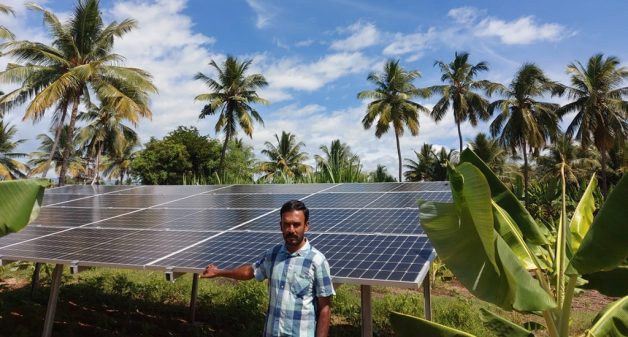
Solar “pumps” up incomes
How can farmers produce the food we eat without stable electricity for irrigation? By switching to solar-powered pumps, farmers become self-reliant and fruitful.

How can farmers produce the food we eat without stable electricity for irrigation? By switching to solar-powered pumps, farmers become self-reliant and fruitful.
What is the major problem farmers face on a daily basis? Electricity. Or rather the erratic supply of it, making farmers spend an inordinate amount of money watering their crops.
Arjunan Thillai was visibly relieved when he diverted water from the moringa trees on his farm to where the Spanish jasmines grow – thanks to the newly installed solar-powered water pump. The constant battle of irrigation had become easier with solar panels.
As one of the countless farmers without a supply of electricity, he used to spend a considerable amount of money on diesel, to irrigate his fields.
“I spent a minimum of Rs 500 per day on diesel to run the pump for three hours,” said Thillai. “After installing solar panels, there’s no diesel expense and so my profit is more.”
Tamil Nadu supplies free electricity to many farmers. But they pay a “price” for it in many ways.
“Power cuts and voltage drops are the norms. Oh, but we do get proper supply during the night!” Sekar Periyasamy, a farmer near Madurai, said sarcastically.
For a start, such severe voltage fluctuation can damage the motor of the water pumps and repairing it becomes an added cost.
But there is also the safety risk a disrupted power supply poses to the many farmers who live away from their fields.

“It’s not easy irrigating our fields at night,” said Periyasamy. “Since it’s free, the government seems to think we don’t deserve an uninterrupted supply during the day.”
For decades farmers would walk or cycle to their fields at night, wondering what animal lurked in the dark. Snake bites were common.
“About 20 years ago, there were quite a few deaths due to snake bites in our region when farmers went to the field at night,” recalled Thillai.
According to Periyasamy, more affluent farmers now use their mobile phones to remotely operate the motor and avoid such risks. But subsistence and tenant farmers like him do not own a smart phone to use such tools.
Contrary to popular belief, barely a third of the farmers in Tamil Nadu get free power. Of the 79 lakh landholdings in the state, only 22 lakh get free electricity. Many must wait for years before they are approved for free power. Those who farm near water bodies are not eligible for free power. And while some who farm on temple land leased to them get free power, others don’t.
For K. Somu, an engineer-turned-farmer, getting an electricity connection meant bearing Rs 1 lakh – the cost of erecting the electricity distribution poles. And he was not assured of an immediate connection.

“Also it wasn’t a free connection. Electricity charge was Rs 3.50 per unit,” said Somu. “So, I opted for solar panels to be self-reliant.”
And it paid off. When his neighbouring farms didn’t get power for three days, Somu could irrigate his crops at no cost.
Farmer S. Thirumurthi who grows organic coconut, turmeric and banana agrees. He gets free power to run the pumps for one piece of land, but has solar panels for another.
“We don’t know if the government will always give out free power. When I produce my own power, I don’t have to depend on anyone,” he said.
Farmers who switched from diesel to solar panel powered water pumps said their incomes increased as their expenses dropped by up to 40%, depending on the terrain, type of crop and acreage.
Thirumurthi, who believes in value addition, produces coconut oil and turmeric powder from his harvests. This helps him earn more. He runs the grinding mills on solar power, after irrigating the fields.

Somu has connected batteries and an inverter to his solar panels, helping him use his computer, a light and a fan in a room he uses during breaks from work. That’s not all.
“I also use solar power to charge my e-bike,” he said with a pleased look on his face.
The solar panels not only increase income for farmers and provide new business and job opportunities for others, but also ease the government’s financial burden.
Tamil Nadu has allocated Rs 19,873 crore towards subsidy for free farm and domestic electricity supply. But most farmers install solar pumps instead of waiting for the government’s free power or solar subsidy. So the more farmers switch to solar the more the government will save on power subsidies.
But most important is the environmental benefit of switching from fossil-fuel pumps to solar-powered pumps. Replacing one lakh diesel-powered pumps with solar pumps would reduce CO2 emissions by 25 lakh tons, while replacing one lakh electric pumps would mean a reduction of 2.5 lakh tons.
“The government should understand that solar addresses climate change concerns. When the world is moving towards solar, we should realise that it’s for (the benefit of) human welfare,” said C. Palaniappan of Sunbest, a solar energy consultant.
Standing as a stark reminder of this is Thillai’s old dust-covered diesel pump, which he refuses to part with. Instead he has placed it right next to his shining solar panels – a constant comparison reminding him of the many benefits solar power is bringing him.
(ALSO READ: Solar pumps brighten lives of Kutch’s salt farmers | Solar pumps bring relief to smallholder farmers in Rayagada)
Jency Samuel is a civil engineer and an independent journalist based at Chennai.